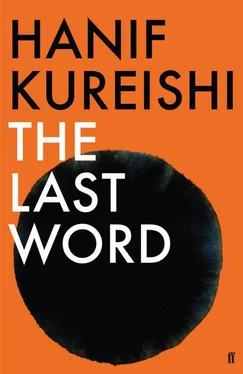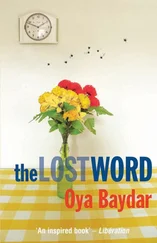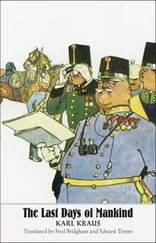He said, ‘What was your reply to his request?’
‘I reminded him of his duty towards Liana. She is a great friend to me.’ She shrugged. ‘I won’t read the book. I know it’s a story. I became his hallucination, all made up and left behind with nothing. Sometimes you can know too much. I feel as if I’ve been shredded. I can’t take any more life right now, if these terrible coils and circles are life. Are they, Harry? Do you know? Won’t you answer me for once?’
He had heard enough. He began to walk back, and she followed him. He said, ‘I wish he could hear about the new and well-paid job I have lined up.’
‘What is it?’
‘It is a gift from Rob, because he pities me after the last job, and wants to give me an easy time. While working on the book about Mum, I will be ghost-writing the autobiography of an international footballer. I will be a centre forward’s horse whisperer. I can safely say we have class, at last, as a family.’
But they were not really a family, and, as she laughed, he recalled his father’s words to him about his mother, which were, roughly: she was your mum, Harry, but to me she was just another girl . Harry wondered if, in twenty years’ time, he’d say such a thing to his sons.
Perhaps Alice was thinking something similar. ‘I’m sorry it didn’t work out between us. But we’re very pleased and grateful, Harry, that you can support us all.’
‘Any time.’ He said, ‘Please hold me, hold me one last time.’
‘Never.’
It was Lotte’s idea that they return to the house and Harry add the account to the end of the book: a few paragraphs about the dying writer. Now, before supper Harry stood at the open door of Scott’s barn, the place where he’d sat for hours with a magnifying glass. Peggy’s diaries were gone, taken to the American archive, as if Peggy herself had finally been taken away. Harry had brought them all back to life, reclaiming her in the book, stressing her contribution to Mamoon’s work, and how he needed her; Ruth also appeared, sending Mamoon forth, and there was enough about Marion, and how she’d led him towards himself at last.
In the kitchen, that night, they all had supper together, and when the children were asleep, chrysalises wrapped tightly in their white blankets, everyone apart from Liana and Harry went to bed early. He watched her poking at the fire in the library, and, at last, had the courage to ask for her view of the biography, and whether anything in it pleased her.
‘I wondered when you’d ask,’ she said, and left the room to return with a piece of paper. ‘I haven’t had much time, I haven’t even read Mamoon’s last book. Did you read it?’
‘I’m going to.’
‘Yes. Now, some of these mistakes angered me very much,’ she said, twirling her pencil and giving him a glorious glare. He was glad to see she had temporarily returned to her old go-getting self. ‘My eyes are not good. My mind won’t stay. But marvellous, in the main. I don’t care so much about this now — it’s you I adore, Harry. You are one of the people I like most. You’ll always have time for me, won’t you? These are my thoughts.’ She put on her glasses. His stomach plunged; he was ready to scribble in his notebook. ‘Didn’t you bother to research thoroughly?’
Her father had been a pharmacist, with a chain of shops in the region. It was true that their name appeared on shampoo. He had founded a country club, with real art on the walls, and built a library. Where did he get the idea she only spoke three languages, rather than four? She had always ridden horses, and for long distances too. And so on. It wouldn’t take him long to make those corrections.
He went out into the yard, where he had spent many evenings worrying, agitated, pacing up and down.
‘I got the gush from Liana,’ he said to Rob on the phone. ‘She called it “splendid, marvellous”. Write that down. Send apologies and money immediately.’
Looking back towards the kitchen, Harry saw that Liana was weeping in the doorway. He dismissed Rob, led her outside into the night air, and asked her what was wrong.
‘At the end, in London, before he became sick, when he fulfilled my wish at last, bless you, because I think you insisted — you were kind, dear boy, kind! — we became close again,’ she said. ‘He wanted to dine with me.’
They strolled in sunny parks; he wanted to buy clothes, and take her advice; something made him talk about his childhood. One afternoon, after coming home, he stroked her hair; he closed his eyes, let her touch him and say her dream about falling over the cliff. He gave his view, his voice was gentle like a blissful kiss. She could have devoured him, her beloved husband, with love. One night, he even took her breast into his mouth.
‘And so, soon, after I have reread his complete works, I will gulp down everything written about him, including you. So thank you for keeping his name in the world. We are grateful, and I love you.
‘But now — now I want him back,’ she said. ‘Where has it gone? I want him back, as he was then! Bring him back to me! Life is too cold without him!’
The last time Harry saw Mamoon was a few months later at a lavish dinner in a grand hall for another writer. Harry didn’t even know Mamoon would show up; he only wanted to spend the evening with Lotte, with whom he was living.
Just before everyone sat down, a dignified Liana, with her head bowed, wheeled the old man, trussed up in a dinner jacket and wearing his literary medals, into the magnificent room. Everyone turned to look, to whisper, to murmur and acknowledge that they’d been in the presence of the writer at least once. There wasn’t a decent bookshop in the world which didn’t carry this man’s work, nor a serious reader who had not heard his name. Someone began to applaud and cheer, and then everyone stood spontaneously; Liana looked up at them and wept while Mamoon moved his mouth soundlessly.
Harry went with Lotte to Liana and kissed her. He bowed to Mamoon and took his hand. Harry had written the book he’d wanted to write, without traducing the old man, and he hoped the writer knew that. Mamoon was badly shaven, and smiled lopsidedly; his eyes were milky. He appeared to greet Harry with a warm if not weak handshake, though looking at him, Harry doubted whether Mamoon had much idea of what was going on.
Liana said Mamoon slept a good deal of the time, and could barely speak or hold a pen. But his eyes were expressive as she fed him, and she loved him, she said, as much as she had the first time they’d met. Not that she had anticipated this kind of isolation or the necessity of such selfless devotion for so long. Alone in the country with Mamoon, Ruth and Scott, she was desperate for visitors, she said; why did no one come? She had spoken to Marion on the phone. As Marion had requested to say goodbye to Mamoon, Liana had invited her to stay: they would talk and talk. Poor Mamoon on his deathbed, thought Harry, surrounded by women he hated. No better way to go: that’s how he would have liked it.
Liana begged Harry to come for the weekend, but he wouldn’t be going back to Prospects House in the near future. He had completed his work, which was to inform people that Mamoon had counted for something as an artist, that he’d been a writer, a maker of worlds, a teller of important truths, and that this was a way of changing things, of living well, and of creating freedom.
Hanif Kureishi was born and brought up in Kent. He read philosophy at King’s College London. In 1981 he won the George Devine Award for his plays Outskirts and Borderline , and in 1982 he was appointed Writer in Residence at the Royal Court Theatre. In 1984 he wrote My Beautiful Laundrette , which received an Oscar nomination for Best Screenplay. His second screenplay, Sammy and Rosie Get Laid (1987), was followed by London Kills Me (1991), which he also directed. The Buddha of Suburbia won the Whitbread Prize for Best First Novel in 1990 and was made into a four-part drama series by the BBC in 1993. His version of Brecht’s Mother Courage has been produced by the Royal Shakespeare Company and the National Theatre. His second novel, The Black Album , was published in 1995. With Jon Savage he edited The Faber Book of Pop (1995). His first collection of short stories, Love in a Blue Time , was published in 1997. His story ‘My Son the Fanatic’, from that collection, was adapted for film and released in 1998. Intimacy , his third novel, was published in 1998, and a film of the same title, based on the novel and other stories by the author, and directed by Patrice Chereau, was released in 2001 and won the Golden Bear award at the Berlin Film Festival. His play Sleep With Me premiered at the National Theatre in 1999. His second collection of stories, Midnight All Day , was published in 2000. Gabriel’s Gift , his fourth novel, was published in 2001. The Body and Seven Stories and Dreaming and Scheming , a collection of essays, were published in 2002. His screenplay The Mother was directed by Roger Michell and released in 2003. In 2004 he published his play When the Night Begins and a memoir, My Ear at His Heart . A second collection of essays, The Word and the Bomb , followed in 2005. His screenplay Venus was directed by Roger Michell in 2006, and Le Week-End in 2013. Something to Tell You , was published in 2008. In 2009 the National Theatre staged an adaptation of his strikingly prescient and acclaimed novel, The Black Album . His Collected Stories were published in 2010.
Читать дальше












